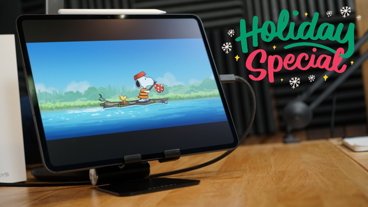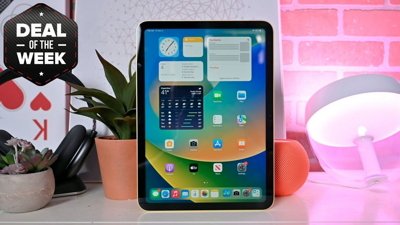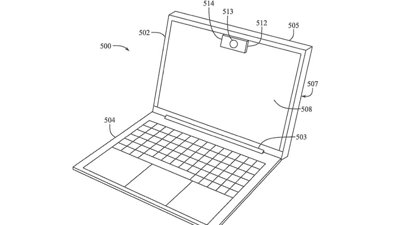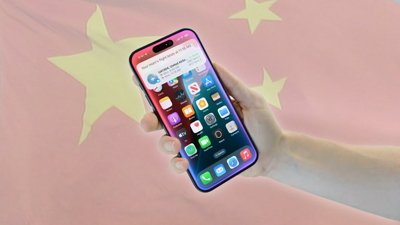Analysts from UBS Investment Research have just returned from meeting with Apple axecutives in Cupertino, which focused primarily on on the company's Intel Mac transition, AppleInsider has learned.
In a research note released on Wednesday, analyst Ben Reitzes said Apple management seemed confident that the Intel transition was on track, but acknowledged the potential for some near-term disruption in unit sales given the timing of product announcements.
"We believe the comments were in-line with our recent checks with dozens of Apple stores, visiting New York area Apple stores and contacting several other retailers like CompUSA nationwide," Reitzes wrote. "Remember, Apple has launched only two Intel-based Macs out of its six product lines – with the rest of the line-up set to transition by calendar year-end."
The analyst also discussed Adobe and Microsoft’s software transition plans at length during the meetings. "Our research indicates that new Power Macs could be announced with Intel processors by September, but Apple’s Rosetta emulation software should still be needed to run Adobe’s major high-end applications like Photoshop at that time," Reitzes wrote. Still, he believes Power Mac sales could be adversely impacted well into 2007 fiscal year, given comments made by Adobe management that it will not update its key creative professional products for Intel Macs until the spring 2007.
Apple management reportedly remains confident that most software applications for the common user will run smoothly when using Rosetta, but did acknowledges some performance degradation for high-end professional usage.
"We believe it is likely that some creative professionals will wait for Adobe to introduce its software in the 'universal' code, which will allow an Intel-based Mac to run the program without translating the code," Reitzes said. He estimates that Power Macs accounted for about 6 percent of Apple’s sales in the first fiscal quarter of the year, or about 12 percent of Mac units sold.
Despite concerns surrounding the Power Macs and some higher-end iMacs given Adobe’s timing, the analyst believes that demand with consumers for new MacBook Pros, iBooks, Mac Minis and other products will more than fill the void in fiscal 2007.
While acknowledging that some users may want to wait for Adobe to introduce its new versions of software, Apple management reportedly feels that Microsoft Office runs relatively well out of the box in Rosetta, especially for word processing. "Apple believes that most users are unaware of any performance issues when using most Office software (Word, Excel, etc.) and that performance characteristics are currently at acceptable levels," Reitzes wrote. "The company also noted that Microsoft, like Adobe, remains a committed partner for Apple in creating software in 'universal' code."
Meanwhile, Apple retail stores surveyed by UBS showed a very positive reaction to the MacBook Pro in terms of pent-up demand that could be realized later this year. "Our surveys and conversations with Apple reveal the level of inquiries regarding the new MacBooks is extremely high, and it is clear that with more models and more applications, Mac sales can benefit," Reitzes said. "As a result, we believe any slowdown in consumer Mac shipments is only a matter of timing over the next 2-5 months."
Looking ahead, UBS believes Apple is hard at work on innovations and is set to announce several new products into 2007. Some of the potential products listed by the firm include a digital hub, iPod speakers and an Apple-branded cell phone.
"We also believe that Apple may choose to enter new consumer markets for iPod speakers and Apple branded cell-phones over the next year where the company would be able to leverage its market leading innovations and creative designs that have made the iPod such a tremendous hit with customers," the firm said. "In addition, we anticipate that Apple will continue to announce new partnerships with content providers and build on the media it currently has available for download."
Apple management also indicated to UBS analysts that it is able to receive higher gross margins on third-party accessories than its own Apple- branded accessories and that it plans to continue to explore new potential products with its partners.
The firm maintains a "Buy" rating on Apple shares with a price target of $100.
 Kasper Jade
Kasper Jade






-m.jpg)






 Andrew Orr
Andrew Orr
 Thomas Sibilly
Thomas Sibilly
 Christine McKee
Christine McKee
 Andrew O'Hara
Andrew O'Hara
 Malcolm Owen
Malcolm Owen
 William Gallagher
William Gallagher

 Sponsored Content
Sponsored Content







29 Comments
Apple actually has either 6 or 7 lines of Macs, depending on whether they plan to keep selling a rugged CRT all-in-one (eMac) to schools. Do they still make eMacs for schools?
Perhaps Apple should take an equity stake in Adobe, large enough to make sure that the company gives the proper "level of attention" to Apple platforms.
Given that Adobe has swallowed the other major plaftorm for web/graphics development (Macromedia), it is a consolidation of some of the key software high end pro users rely on.
I've often wondered why Apple hasn't done the same with PortalPlayer (if they haven't already)--given the tie to the iPod plaform. Unless at some point apple plans to dump them and develop their own IP in the mp3 player space. Wonder what would happen if Microsoft bought them and then rolled out their own branded xbox-lite media player?
Just how much cash is Apple sitting on?
Has Apple acquired any technology firm in the last 5 years?
Apple actually has either 6 or 7 lines of Macs, depending on whether they plan to keep selling a rugged CRT all-in-one (eMac) to schools. Do they still make eMacs for schools?
I count five lines that are available to the public. You have the four from the matrix (desktop or laptop vs. consumer or pro), i.e., iBook, iMac, PowerBook (Mac Book Pro) and PowerMac, and the odd one out, the Mac mini. The eMac was returned to its original purpose: a computer built for schools.
I'm getting a little sick and tired of Adobe sabotaging Apple. Apple ought to buy a big interest in Adobe (maybe even a controlling interest) and ensure that its products are ready for the Mac first. On the other hand, maybe Apple can create a Photoshop killer and be done with Adobe's grip on its future.
I count five lines that are available to the public. You have the four from the matrix (desktop or laptop vs. consumer or pro), i.e., iBook, iMac, PowerBook (Mac Book Pro) and PowerMac, and the odd one out, the Mac mini. The eMac was returned to its original purpose: a computer built for schools.
I'm getting a little sick and tired of Adobe sabotaging Apple. Apple ought to buy a big interest in Adobe (maybe even a controlling interest) and ensure that its products are ready for the Mac first. On the other hand, maybe Apple can create a Photoshop killer and be done with Adobe's grip on its future.
does it occur to you that it's quite possible that apple sabotages adobe plan's for the direct future. i think adobe was already programming for and even testing its next gen creative suit apps when apple throw in it's universal binaries bomb.
[edit] you forgot xserve [/edit]
does it occur to you that it's quite possible that apple sabotages adobe plan's for the direct future. i think adobe was already programming for and even testing its next gen creative suit apps when apple throw in it's universal binaries bomb.
[edit] you forgot xserve [/edit]
Well that goes to the heart of what kind of strategic relationships does Apple build with MAJOR developers on its platforms?
Does Apple simply wait until the day before a public announcement of a technology shift or strategic direction to clue their partners in?
Does Apple even operate with the notion of their key platform providers being privy to strategic and tactical direction?
If not, WHY NOT?
Jobs could certainly NDA Adobe at the senior executive level and clue them in that they should move say from one development platform to another (as is the case with the move to intel).